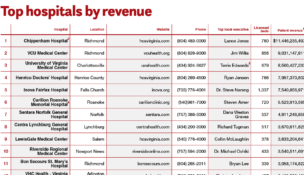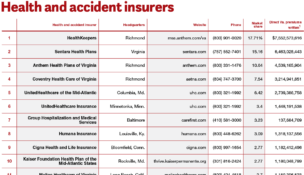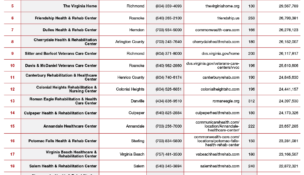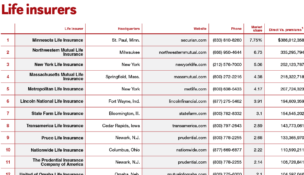Supporting independence
Privia Health gives physicians business tools – and autonomy
Supporting independence
Privia Health gives physicians business tools – and autonomy
Two years ago, Dr. Fred Taweel at Internal Medicine Associates of Reston concluded that the changing nature of the health-care business was going to make it almost impossible for him and his partners to continue running their practice on their own. Nonetheless, they weren’t keen on the solution that has become common with many doctors — selling to a hospital-affiliated group.
“We were adamantly opposed to that because we felt it would usurp our independence and require us to meet patient quotas and change the way we wanted to take care of our patients,” Taweel says.
They discovered a more workable option with Privia Health. The Arlington-based physician practice management and population health technology firm offers physicians the benefits of being part of a large organization without eliminating their autonomy.
“Our physicians get to decide for themselves how busy they want to be, how best to structure their day and their practice,” explains Jeff Butler, Privia’s CEO. He says that, while physicians who sell to hospital groups typically become their employees, Privia’s physicians act as partners and have an ownership stake in the firm. “We’re here to give them full support and help them be more successful, not to dictate how to operate their office or how to practice medicine.”
Idea born in South Africa
The model was born out of work Butler did with a previous company in rural South Africa while helping doctors treat HIV/AIDS patients. He and his colleagues organized the doctors into a network and developed technology that could better monitor patients — determining, for example, who had missed medications and needed home-based support — and evaluate clinical outcomes. As a result, medication adherence levels and patient improvement outcomes there were as good or better than some of the best programs in the U.S.
“We attributed those results to the fact that we were driving all of these interventions through physicians that the patients trusted, and we felt that by engaging patients through the doctor, we were able to get much higher levels of patient engagement and compliance than you typically see,” Butler says.
With Privia, Butler and Dave Rothenberg, who serves as the company’s president, are replicating that model in the U.S. with the aim of giving physicians the business and technological foundation they need so that they can spend more time caring for patients.
The model is resonating across the health-care industry. Internal Medicine Associates became the first practice to join the Privia Medical Group in April 2013. Since then, another 220 physicians from 80 offices in the Washington, D.C., metropolitan region have followed, making Privia one of the fastest-growing physician groups in the country.
And it’s attracted the attention of investors. In September, Brighton Health Group, a Goldman Sachs affiliate and holding company, merged with Privia Health in a $400 million investment deal that will expand the Privia network to cities outside of the D.C. area.
“We’re able to bring the operating assets and technology platform that Privia has developed together with some of the relationships that we’ve developed in other markets across the country,” says Bill Sullivan, the CEO of Brighton Health. He expects to start building Privia physician networks in Orlando, Atlanta, New York and New Jersey within the next few months.
Emphasis on outcomes
Privia’s goal isn’t to buy up practices in order to apply volume and economies of scale. Instead, as the insurance industry moves toward a reimbursement model rewarding doctors for improving patient outcomes (rather than paying fees for services such as office visits and procedures), Privia sees an opportunity to free up physicians to better focus on patient care.
“For doctors to be successful in participating in those kinds of new reimbursements, they have to have a lot of sophistication around them,” Butler explains. “It takes a lot of technology and a lot of personnel, and small and medium-size practices just don’t have those resources.”
Privia’s model calls for organizing doctors into a network built for population health, with a mix of primary-care providers and specialists. Underpinning that network is technology, data analysis, patient monitoring activities and a support team of home-based care teams, health coaches, treatment adherence counselors, fitness specialists and nutritionists.
Taweel says that Privia’s technology platform and support staff continually keep him informed about his patients. At the click of a button, for example, he knows which patients haven’t had a mammogram in the past two years or which diabetic patients aren’t well controlled on their hemoglobin numbers. “If I have a new patient diagnosed with diabetes, that will trigger a whole cascade of care points across the network,” he explains. “So, the patient will immediately get a call from a Privia wellness nurse to provide fitness and nutrition care or, if their numbers are off or they don’t pick up their prescription, we’ll know that and we can intervene.”
Support staff
Privia also employs engineers, software developers, contract negotiators, billing staff and practice management specialists to help take care of business and administrative functions. A second business, Privia Quality Network, is an accountable-care organization and contracting vehicle that helps physicians negotiate contracts with self-insured payers, health plans and Medicare.
“We’re really about giving physicians a sort of sophisticated platform that they can come dock into and then get immediate access to all kinds of resources and enable them to focus their day on taking great care of patients and be successful doing that,” says Butler.
He says many Privia practices see a 30 percent-plus increase in overall revenues within 90 days of going live with the firm, and Privia doctors also realize a 30 percent savings in their medical malpractice premiums. “We overinvest in training, and we overinvest in infrastructure so our physicians see a very fast impact,” he explains.
In exchange for all of this, Privia takes a percentage of the physician’s collections. “Essentially, our incentives align with the physicians’ incentives,” Sullivan says. “The more successful they are, the more successful we are.”
Taweel considers the model an opportunity for physicians who want to remain independent but still have have time to focus on their patients and get rewarded for their work. “I get to decide whether I want to see 10 patients or 30 patients a day. My partners and I get to decide which employees we hire, how many vacation days we take and when and how to divvy up the income of the practice,” he explains. “So we still have a great deal of control, but we still get the benefits of being with a larger affiliated group that has the capital, infrastructure and resources to help us provide better patient care.”
C

















